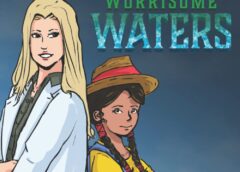The first book in the Journey to a Better World series teaches kids about the causes and effects of water pollution and what people can do to help.
Reviewed by Jamie Johnson
The VISTA Center of Louisiana Tech University in collaboration with The Inspire Project is publishing a series of four children’s books to teach children about science and social justice. The books are set in the fictional Amica County, and the first book, Worrisome Waters, follows Emma, a girl who is concerned about water pollution in a local lake when she sees dead fish washing up on the shore. Unlike others around her who don’t seem to notice or care, Emma is determined to figure out what’s going on.
Read more about Journey to a Better World: VISTA Center students illustrate first book of “Journey to a Better World” series
Teaching about water pollution and stewardship of nature
One goal of the series is to encourage children not only to be aware of issues like water pollution but also to feel empowered to do something about them. Emma notices the dying fish and murky water and decides to take some samples to Dr. Tracy Fanara, who tests them in her lab.
They learn that algae has overrun the lake, and Dr. Fanara teaches Emma about how the chemical balance of the lake has to be just right, and pesticides and human structures have prevented the natural filtration process. Normally, rainwater is cleaned before it reaches the lake, so their goal is to figure out how to help that natural process get back on track.
Together, they come up with a plan to reroute the rainwater so it can be filtered properly, then present this plan at town hall. Their plan is met with resounding approval, and many community members work together to solve the water pollution problem in their lake. When the lake returns to clean blue again, Emma can feel proud of the work she did to help it heal.
Useful in the classroom and at home
Illustrator Ronald McKinney’s art is distinctive and charming, and his eye for framing is great. Author Tracy Blom’s text talks about science in plain language that is approachable for children (and the main body of the story also rhymes), but Worrisome Waters teaches some advanced vocabulary words as well. These terms are defined at the back of the book in what looks like Emma’s own notebook—lined paper with handwritten notes and drawings to aid understanding. This provides an opportunity to teachers or parents to reinforce how to use glossaries and what to do when you find a word you don’t know. Sidebars in the text provide interesting science facts as well as useful background information about the water cycle.
Readers are then encouraged to learn through doing at the end of the book with a science experiment about water pollution. Using commonly available supplies, kids can try out their own miniature filtration system! First, they create a “contaminated” water jar with water and sand. Then, they filter the mixture through a coffee filter into a second jar. There’s space to write down their observations before, during, and after pouring for both the unfiltered and filtered water.
And where will you go from there? Observational trips to a local body of water, creating dioramas of watersheds, writing to town hall about the environment, there are many possibilities to explore!
To get one for yourself or your classroom, go to Journey to a Better World: Worrisome Waters. Or, contact VISTA to buy in bulk or donate a class set to a school.
Read about the next book in the series: “Bully Blues” and Unlearning Xenophobia
Read about the third book in the series: “Flu Finders” Teaches What to Do When Sick
About the Reviewer
Jamie Johnson is a copy editor, proofreader, and word nerd. In their free time, they can often be found hiking, reading, or talking to cats (all three on a good day).
When you purchase books through links on our website, we may receive a small commission. This helps support our nonprofit programs and charity work. Thank you for your support.

